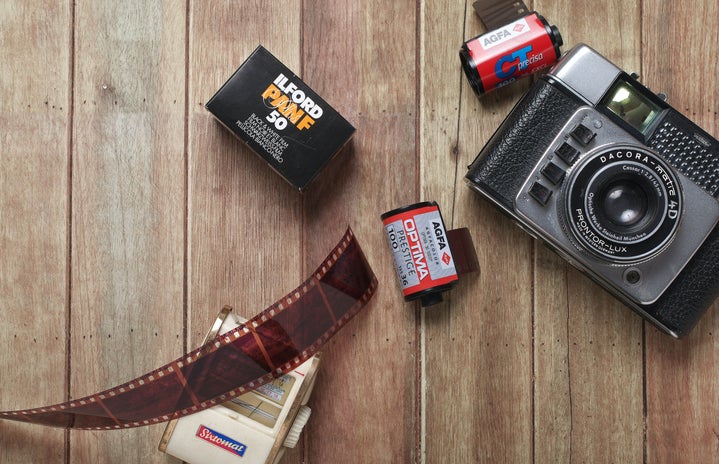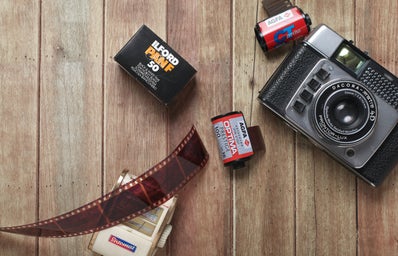In recent years, there’s been a boom in people uploading pictures that they have taken on a film camera and uploading them to their social media. While some have hobbies of collecting old cameras, I have been seeing members of Gen Z really lean into buying disposable film cameras and using them to take photos on them for “the aesthetic” – myself included. However, with the near-professional level of today’s phone cameras, why do we choose to revert to old-school forms of casual photography? While part of it can be attributed to the way the photos look, that effect can be achieved through photo editing. As someone who is obsessed with old cameras and using them, I believe that this phenomenon poses deeper questions about our generation’s relationship with photos, social media, and visual media. Through this article, I will touch on why we have such a strong interest in this form of media, as well as give some pointers on how you can also enjoy film and digital cameras as a hobby.
One of the primary reasons that I believe that we have taken a step back from our phone cameras to film and digital cameras, is to establish space between ourselves and the social media-oriented aspect of photos. When thinking of what a purse contained in the early 2000s all our things used to be separate: a cell phone, a camera, an mp3 player, etc. But right now, we have all of those things on one device, our smartphone. At the point where a phone was more than something to make calls on and became a place for creating a visual representation of oneself. The convenience of having everything in one place eventually lost its novelty and actually started to become isolating, even pressuring. While smartphones have convenience, we have lost the ability to separate our memories from our social media image.
When observing the extent of our phone camera capabilities and being able to take thousands of photos/videos in 4K quality, we have grown obsessed with the perfection of photos and memories because we are able to have unlimited shots with our phones. This kind of attitude towards pictures of ourselves and the culture that is built in social media sharing has created a toxic relationship between images and perceptions of ourselves. When using physical forms of photos like film or digital cameras, there is more intention with each shot. You do not get unlimited photos with film, and there are still limits to digital cameras. Due to this, there is less room to obsess over what the photos contain and how we look in the photos, and more emphasis gets to be placed on the memory that takes place in the photo/the coolness of the film/digital appearance itself. If we are being honest, sometimes you do not want to see each one of your pores in high definition, you just want to capture the memory. By not seeing that photo immediately to retake and reposition, we can enjoy photos and memories outside of the realm of likes, sharing, or commentary. Memories can exist for the sake of being memories, and I recommend cameras if you are looking to bring the fun and novelty back into photo taking.
“How can I get into cameras?”
Currently, I have two film cameras and one old digital camera, and I will say there is something special about having a separate space for my memories. There are pros and cons to film as well as digital cameras that I will get into to give guidance on where to start.
Film
Pros:
- Experimenting with different kinds of film to achieve different looks
- Developing physical copies of your photos
- Getting into developing your own film as a hobby
Cons:
- Film can get expensive. From buying certain rolls of film and going to get the photos developed, it can add up quickly.
- You only have about 30 shots on a roll, meaning you have to really be intentional with your pictures.
I think if you are looking specifically into getting into the art of film photos and want to pursue it as a long-term hobby, it is definitely worth looking into a film camera. Some people will start with a Polaroid camera like Instax to get that same nostalgic look, while others will start with disposable film cameras like the Fuji ones. If you are looking for a reusable film camera or even a little more of an old-school camera, you can look on places like Facebook Marketplace, thrift stores, or even dig through your parents’ old stuff. My main film camera, the Olympus 140 Zoom Deluxe, I got from Facebook Marketplace for a reasonable price, but ultimately, the price can vary depending on the seller.
Digital Camera
Pros:
- You can still get that old camera look
- You can get 50-100+ photos
- You can just plug the camera into your laptop, no need to buy physical copies unless you want to.
Cons:
- It does not look exactly the way film does. Photos depend more on the camera whereas with film, you can use different film rolls to change up the look.
I think digital cameras are a great option, especially if you’re looking to save some money and not have to constantly buy your photos. They are quick to retrieve and have the same fun as having a physical camera. They’re great for causal photos, light to carry, and really fun with friends. I currently have a Sony Cybershot from 2008 that I adore.
If you are looking to get into cameras for a fun hobby, to achieve photo effects, or you are just trying to wane away from social media, I cannot recommend them enough. They are lots of fun to bring out with friends and are really interesting to get into as a personal hobby.

